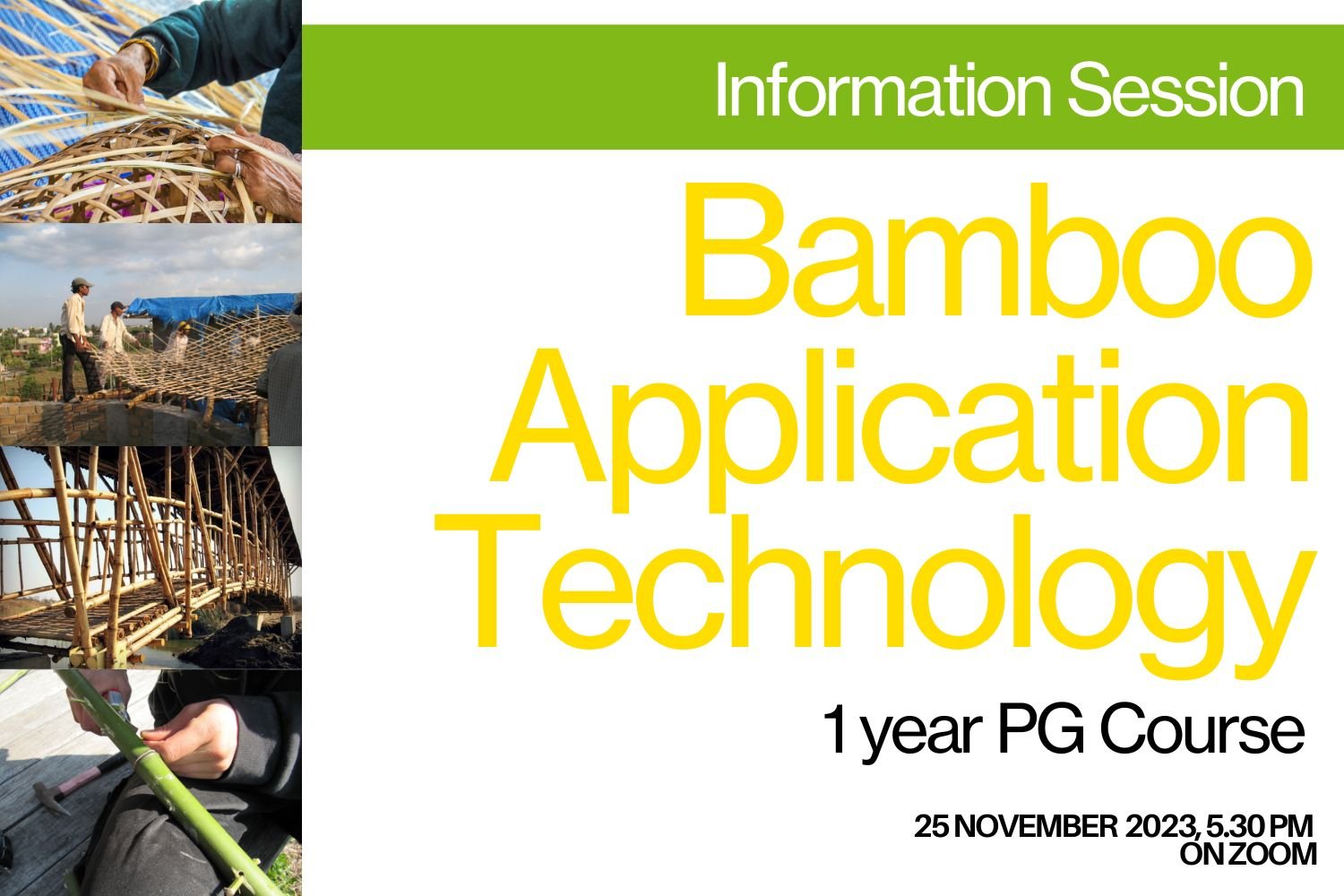
Upcoming workshops and events

Launch: The Bamboo City Project
We are launching The Bamboo City Project in conjunction with UN Climate Change Conference COP28, currently taking place in Dubai, UAE.
About the project
The number of people living in cities is increasing worldwide. Currently, 55% of the global population lives in urban areas, and this is expected to rise to 60% by 2030. In India, 461 million people are living in cities, and this number is growing by 2.3% each year. We still need to build 70 to 80% of the infrastructure that will be required by 2050.
Bengaluru, which had a population of 1.2 million in 1960, now has 13 million residents. Bangalore’s rapid urbanization places a lot of pressure on the city's environment. People are moving to cities in search of better opportunities, causing the city to expand outwards towards its boundaries. Many people are building new structures near lakes, reducing the amount of water bodies in the city. The number of private vehicles is increasing, leading to more air pollution from traditional building materials. Waste is being dumped into water bodies and open lands, causing water and land pollution. The city's excessive use of concrete reflects sunlight and creates an urban heat island effect, as well as increasing flooding.
To address this, a project using bamboo, an eco-friendly and efficient natural material, to reduce the effects of climate change in the city. The project includes a plan to plant bamboo across the city and incorporate it into the construction sector through prototype buildings. Various building types have been documented, and bamboo building codes will be updated soon. Suitable bamboo species have been identified for Bengaluru, and stakeholder surveys have been conducted.
A master plan for bamboo plantations in both the CBD and peri-urban areas is being developed, along with an action and implementation plan. A master plan for bamboo plantations in both the CBD and peri-urban areas is being developed, along with an action and implementation plan.
Event Schedule
Project Presentation by Ar. Neelam Manjunath and Research Associates (20 Minutes)
Panel Discussions
Bamboo Plantation (30 Minutes)
Bamboo in Buildings and Infrastructure (30 Minutes)
Enterprise Development in the Bamboo Sector (30 Minutes)
Wrap up (10 Minutes)
Panelists
Ar.Neelam Manjunath - Founder, CEO and Chairperson, CGBMT
Dr. A. N. Yellappa Reddy (IFS Retd) - Chairman, Bengaluru Environment Trust
Shri. N. Sivsailam (IAS Retd) - Administrative Member, Karnataka State Administrative Tribunal, Bangalore
Susanne Lucas - Executive Director, World Bamboo Organization
Ar. Jaisim Krishna Rao - Owner, Jaisim-Fountainhead
Prof. D K Anand - Professor, College of Architecture Trivandrum
Dr. Sanjeev Singh – Dean and Associate Professor, School of Planning and Architecture
Prof. Ramakrishna Hegde - Professor, College of Forestry, Ponnampet, Keladi Shivappa NayakaUniversity of Agricultural and Horticultural Sciences
Dr. Aswath M U – Principal, Bangalore Institute of Technology
Nidhi Hanji – Legal Associate, ESG
Annapurna Kamath – Jala Poshan Trust , Jakkur
You can find out more about the project here.
Please join us as we embark on this exciting journey!

Information Session: Bamboo Application Technology
Are any of these topics of interest to you and pique your curiosity?
Cultivating and harvesting bamboo
Reinforcing the inherent strength of bamboo
Utilizing bamboo in artistic and creative pursuits
Developing business models and strategies for bamboo-based products and cottage industries
Constructing long-lasting and sustainable bamboo structures
Innovating new industries with bamboo
Utilizing bamboo solutions for disaster management
Launching your own bamboo-centered enterprise
Come join us this Saturday, November 25 at 5.30 pm IST to learn more about our 1 Year Bamboo Application Technology Post Graduate Course which incorporates all of the above and more!

Launch: CGBMT- School of Bamboo Studies
CGBMT has been contributing to the bamboo sector for over 2 decades through Advocacy, Education, R&D, and skilling.
CGBMT- SoBS will build upon and further broaden its initiatives to comprehensively cover incubation and enterprise development for the bamboo sector to close the loop.
Why?
Bamboo, undoubtedly, stands as an extraordinary material that not only exudes its eco-friendliness and resilience but also showcases its incredible versatility, with a staggering number of over 2000 uses that seamlessly intertwine with the lives of individuals residing in the Global South.
At COP 27, the remarkable potential of bamboo gained well-deserved attention, as it has been hailed as one of the top 5 nature-based solutions for mitigating the alarming effects of global warming.
To ensure that this sector continues to flourish and reach its fullest potential, the presence of skilled human resources becomes an integral imperative. This very mandate is wholeheartedly embraced by the Centre for Green Building Materials & Technology through its School of Bamboo Studies (CGBMT-SoBS), striving to cultivate and nurture the much-needed workforce in this dynamic field.

